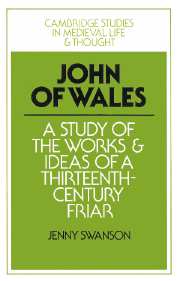Book contents
- Frontmatter
- Contents
- Acknowledgements
- List of Abbreviations
- Introduction
- 1 The career of John of Wales
- 2 The works of John of Wales: sources and technique
- 3 The Breviloquium de Virtutibus Antiquorum Principum et Philosophorum
- 4 Communiloquium, part 1: John of Wales on the state and its members
- 5 Communiloquium, parts 2 and 3: John of Wales on secular society
- 6 Communiloquium, parts 4–7: John of Wales on scholars and churchmen
- 7 Philosophers and saints: the Compendiloquium and Breviloquium de Sapientia Sanctorum of John of Wales
- 8 The works of John of Wales: spread and influence
- Conclusion
- Appendices
- 5 Checklist of early printed editions of works by John of Wales
- Bibliography
- Index
6 - Communiloquium, parts 4–7: John of Wales on scholars and churchmen
Published online by Cambridge University Press: 23 September 2009
- Frontmatter
- Contents
- Acknowledgements
- List of Abbreviations
- Introduction
- 1 The career of John of Wales
- 2 The works of John of Wales: sources and technique
- 3 The Breviloquium de Virtutibus Antiquorum Principum et Philosophorum
- 4 Communiloquium, part 1: John of Wales on the state and its members
- 5 Communiloquium, parts 2 and 3: John of Wales on secular society
- 6 Communiloquium, parts 4–7: John of Wales on scholars and churchmen
- 7 Philosophers and saints: the Compendiloquium and Breviloquium de Sapientia Sanctorum of John of Wales
- 8 The works of John of Wales: spread and influence
- Conclusion
- Appendices
- 5 Checklist of early printed editions of works by John of Wales
- Bibliography
- Index
Summary
John's discussion of non-secular groups begins with the fourth part of Communiloquium, which bears the heading De republica ecclesiastica. It deals with the various ranks of the clergy, their duties and appropriate behaviour, and supplies recommendations for further reading for those who are interested. There are five distinctions in this part of the work, their main topics being the ranks of the clergy, the proper behaviour of priests and of bishops, the various ecclesiastical offices and the appropriate behaviour of ecclesiastical judges.
John opens with a brief statement of purpose. He tells us that he has previously produced authoritative tales and exempla from which the preacher can instruct illiterate men, according to their different ranks and conditions. In this part, however, are gathered together the tales and exempla with which the preacher may more usefully instruct literate churchmen. He confirms that the respublica ecclesiastica is composed of such (literate) persons, the head being the summus pontifex or the pope. John recommends part I of Communiloquium, where he discussed the head of the civil republic. All this, he says, can be adapted to the pope, who is the head of everything. What has been said of the eyes and ears, heart, hands and feet can also be adapted to the limbs of the respublica ecclesiastica.
- Type
- Chapter
- Information
- John of WalesA Study of the Works and Ideas of a Thirteenth-Century Friar, pp. 142 - 166Publisher: Cambridge University PressPrint publication year: 1989



